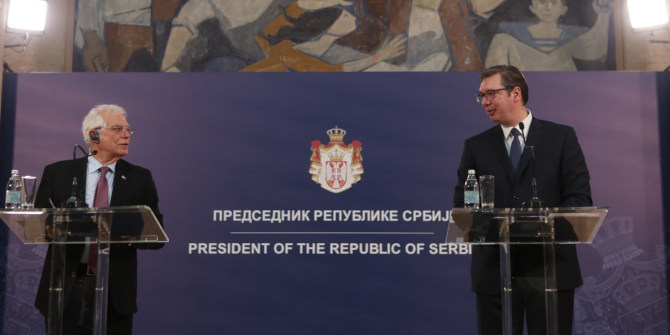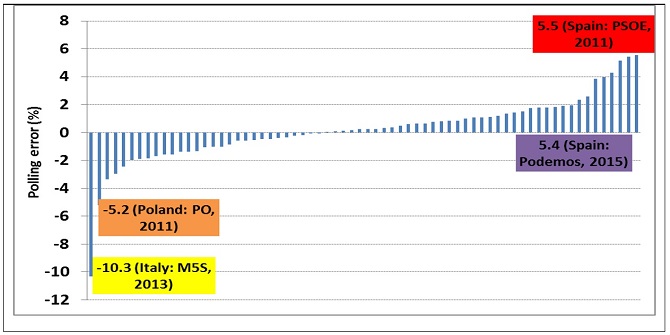 A number of rallies calling for greater restrictions on immigration have been held in Germany by the ‘Pegida’ movement (Patriotic Europeans against the Islamisation of the West). Julian M Hoerner writes on the link between the movement and the anti-euro Alternative für Deutschland (AfD) party, led by Bernd Lucke. He argues that with the AfD appearing to be broadly supportive of Pegida, an alliance between the two groups could reshape the right of the German party system.
A number of rallies calling for greater restrictions on immigration have been held in Germany by the ‘Pegida’ movement (Patriotic Europeans against the Islamisation of the West). Julian M Hoerner writes on the link between the movement and the anti-euro Alternative für Deutschland (AfD) party, led by Bernd Lucke. He argues that with the AfD appearing to be broadly supportive of Pegida, an alliance between the two groups could reshape the right of the German party system.
In post-War Germany, it was once taken for granted that there could be no party to the right of the Christian Democratic Union (CDU) which respected the German constitution, the Grundgesetz. This perceived wisdom has recently been called into question with the electoral success of the Alternative für Deutschland (AfD). The party has the appearance of being populist and anti-euro, but is led by respectable figures from the conservative German establishment, many of them academics. However, the recent rapprochement of the party to a new anti-Islam, anti-immigration movement called ‘Pegida’ (Patriotic Europeans against the Islamisation of the West) calls the party’s liberal credentials into questions. The AfD and Pegida share the same regional strongholds and their supporters are united by unease with recent changes in German society.
The ‘black box’ of the Pegida movement, with its diverse membership, might prove to be a link between the AfD and more radical and extremist elements, especially in Eastern Germany. An alliance of these two political forces carries the potential to shift the German party system to the right in the long run, which could restrict the room for manoeuvre of future German governments with regard to Germany’s policy on the European Union and immigration.
AfD and Pegida
Formed in early 2013, the AfD was born out of an opposition to rescue packages and financial aid to Eurozone countries in the context of the Euro crisis. The party’s leader, Bernd Lucke, used to be a Professor for Macroeconomics at the University of Hamburg. Another famous member and vice spokesperson is Hans-Olaf Henkel, the former head of the Federation of German Industry (BDI), and a former supporter of the liberal FDP. The personnel of the party and its public appearance thus seemed to be fundamentally different from other, usually short-lived parties on the right fringe of the German party system, such as the German People’s Union (DVU), Die Republikaner and the National Democratic Party of Germany (NPD).

The AfD portrays itself as anti-euro, but not anti-Europe, conservative but also liberal, and thus appears moderate in comparison to right-wing populist parties in other European countries. Its strategy has been rather successful: the party narrowly missed representation in the Bundestag in the 2013 federal elections, won 7 seats in the recent European Parliament elections and received a vote share of around 10 per cent in three East German regional elections in 2014. Germany now seemed to have a respectable party to the right of the CDU.
However, the electoral rise of the AfD was accompanied by the emergence of a grassroots movement of the right which represents something of a novelty in German post-War history. At the core of the programme of the Pegida movement is the protection of ‘German culture’, an end to mass immigration and the perceived ‘Islamisation’ of German society. The movement organised its first protest march in the East German city of Dresden with a turnout of 350 people on 20 October 2014, but grew steadily and reached 17,500 participants on 22 December.
In Dresden, Pegida tries to place itself in the tradition of the protests against the GDR regime in 1989, with ‘Wir sind das Volk’being chanted (‘We are the people’ – the slogan of the East German civil rights movement). Quickly, similar marches – or ‘strolls’ as the movement calls them – were organised throughout Germany, albeit less successfully than in Dresden. On 8 December, 400 supporters turned up in the city of Düsseldorf while 1,100 peopleprotested against the movement. In Munich, 12,000 peoplemarched against PEGIDA, without a demonstration of the group even taking place.
The supporters of the movement are varied, ranging from middle-class conservatives to members of neo-Nazi groups. Its leadership, however, is highly controversial. The founder of the movement, Lutz Bachmann, who regularly warns of criminal immigrants and asylum seekers, was convicted for multiple burglaries and drug possession, and, rather ironically, fled to South Africa to avoid a prison sentence. The organiser of a protest in the city of Bochum, Melanie Dittmer, is a former member of the ‘Young National Democrats’, a Neo-Nazi group, and recently stated that ‘it did not matter’ to her whether the Holocaust happened or not since it took place so long ago. On another occasion, she showed a remarkable obliviousness of historical facts when she claimed that Pegida stood in the tradition of the Spartans, ‘who repelled the Muslims from Greece in the Reconquista’.
All German parties besides the AfD remain critical of Pegida. Even though some senior figures, such as Mr Henkel, recommend their party keeps its distance from the movement, there is generally a clear trend towards cooperation between the two groups. Alexander Gauland, leader of the AfD in the Brandenburg Landtag and vice-spokesperson of the party, visited a demonstration in Dresden and views the main tenets of the Pegida movement in a positive light. He recently defended the movement against criticism by German chancellor Angela Merkel. In Düsseldorf, the local Pegida branch is organised by an AfD member. The leader of the party in the Landtag of Saxony, Frauke Petry, defended the movement in a recent parliamentary debate and is planning to meet its leaders in early January. Even federal party leader and MEP Bernd Lucke has called Pegida ‘good and appropriate’.
In many ways, the AfD and Pegida are indeed natural allies. In a recent survey by the pollster Forsa, only 13 per cent of all respondents stated that they could imagine joining a PEGIDA demonstration, among AfD supporters, however, the figure is 71 per cent. Both the AfD and Pegida have their strongholds in the eastern Länder, in particular in Saxony, where the AfD reached 6.8 per cent in the 2013 federal elections and recently won 14 seats in the regional parliament. Saxony historically votes to the right of the federal trend and used to be a stronghold of the NPD. As Andreas Zick has claimed, the success of the AfD, and the different popular responses to the rise of the Pegida movement, could point to an increasing division of the political cultures of the East and West of the country.
The political consequences of the rapprochement between the AfD and Pegida are significant. With all other mainstream parties opposing the movement, the friendly approach of the AfD is bound to make it more popular, especially in Eastern Germany. Over the last decade, the increasingly centrist policies of Angela Merkel’s CDU have left a political vacuum to the right of the party. In the past, the national-conservative wing of the CDU and CSU was able to integrate national-conservative voters into the political mainstream. An alliance between the AfD, as a parliamentary populist party of the right, and Pegida, as a right wing grassroots movement, would be bound to reshape Germany’s political system – and the consequences could soon be felt in the form of a shift in Germany’s policy towards the EU and immigration.
Please read our comments policy before commenting.
Note: This article gives the views of the author, and not the position of EUROPP – European Politics and Policy, nor of the London School of Economics.
Shortened URL for this post: http://bit.ly/14dggUx
_________________________________
 Julian M Hoerner – LSE
Julian M Hoerner – LSE
Julian M Hoerner is a PhD student at the European Institute working on the activity of national parliaments in EU affairs with a focus on the role of Eurosceptic parties.





The dangers that Julian Hörner so clearly describe are indeed real. It is encouraging, however, to witness the overwhelming opposition to the Pegida movement voiced by all the major political parties, religious organisations and ordinary German people voting with their feet.
The significance of the fact that the Pegida movement is predominantly an east German, ex-German Democratic Republic, phenomenon is easily overlooked. In Dresden, the city in which the largest Pegida demonstrations against ‘islamisation’ take place, there are fewer muslims than anywhere else in Germany. What seems to be motivating many of the participants is a feeling of being left behind, of being insecure in their jobs, of being ignored by the federal politicians in the west. There is too a tradition of taking to the streets in Dresden and a certain nostalgia for the pre-democratic state of full, 100% employment.
The danger of a realignment on the right in Germany can be mitigated by politicians who are willing to listen to and understand the real grievances behind the protests and not damn them all as racists. I, nevertheless, will be going out next week onto the streets of Düsseldorf, to demonstrate against that aspect of Pegidaism.